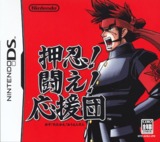A review of Ossu! Tatakae! Ouendan! that I included in my fanzine, Extra Life. A sort of DS killer app!
User Rating: 8.9 | Osu! Tatakae! Ouendan DS
It is rapidly becoming apparent that the Nintendo DS is finally coming into its own. After a fairly dry period of games throughout much of the machines first year, third party developers are beginning to release more and more games that brilliantly show off the capabilities of the machine. Ossu! Tatakae! Ouendan! is most definitely one of these games. Roughly translating as “Go! Fight! Cheer Squad!” Ouendan is a rhythm game developed by the same team that brought us Gitaroo Man on the PS2. The game puts you in the collective shoes of a group of solemn male cheerleaders who keep the troubled inhabitants of their community happy by cheering them on to an assortment of J-Rock and J-Pop songs. As the cheer squad, you must perform a specific dance routine in time with the music to keep whoever just screamed ‘Ouendan’ happy. While Gitaroo Man asked you to play the guitar notes of the game’s songs, Ouendan requires you to keep the beat going so that your cheer squad can continue with their meticulously planned movements. You do this by tapping the stylus on the many numbered circles that appear on the touch screen throughout the levels. Of course, this is not really as simple as it sounds, as you must tap the beat markers with excellent timing if you want to complete the level with a high score. To help you with your timing, each beat marker is surrounded by a shrinking circle. When this shrinking circle is the same size as the beat marker it is time to hit the beat. There are ‘excellent’, ‘good’ and ‘bad’ rewards on offer for your timing should you not miss altogether. Although the game does begin with a rather sedate pace, the difficulty is ramped up considerably only a short way into the game, as the levels introduce new styles of beat markers that can be ‘traced’ (recalling Gitaroo Man’s trace line) as well as spun. Advanced levels also feature hundreds of beats for you to memorize. There are 15 levels in all, as well as several difficulties, and each one presents its own challenge, rather than being a faster version of an easier difficulty. There certainly is a huge amount of challenge involved in Ouendan, even for seasoned players of this genre.
Accompanying the gameplay are a series of rather well drawn anime/manga storyboards that play out according to your progress. These animations lend Ouendan a lot of its charm and give the game a very unique and desirable aesthetic quality. Finally, the most important part of any musically oriented game is the soundtrack. As you may have guessed, the songs on offer are all excellent and suit the mood and personality of each level to a great effect. If there are any problems in the sound department, it is that the DS speakers are more than a little tinny, however this problem is easily resolved with earphones or a set of meaty speakers (the game sounds fantastic this way). Although a Japanese only game, there is a minimal amount of text involved for those looking to import. I can thoroughly recommend Ouendan to any DS owner, and to any fans of music games currently sans DS.

